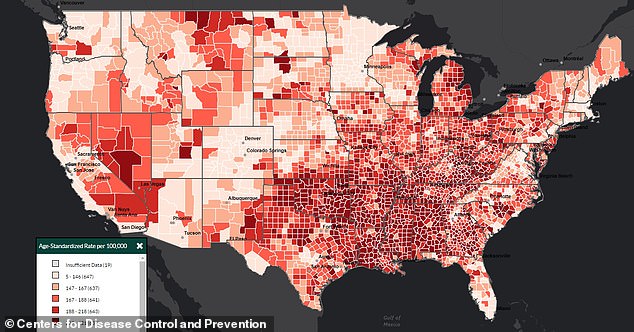Heart disease in 130 million Americans increases dementia risk: ‘This is critical’
A group of heart conditions that affects one in three Americans could cause a surge in dementia cases in the US, experts warn.
Experts from the American Heart Association said coronary artery disease, heart failure and atrial fibrillation prevent blood from flowing properly to the brain, leading to the death of brain cells and tissues.
Since more than 130 million Americans suffer from some form of heart disease, the experts noted that preventing it early through diet and exercise could be the key to stopping dementia, which affects more than 7 million Americans every year .
Experts from the American Heart Association warned that coronary artery disease, heart failure and atrial fibrillation increase the risk of dementia
Dr. Fernando Testai, a professor of neurology and rehabilitation at the University of Illinois who worked on the statement, said: ‘Dementia is widely viewed as an incurable and brutal disease that cannot be prevented.
‘However, there is evidence that adopting a healthy lifestyle and identifying and treating vascular risk factors early can help maintain normal brain function and reduce the burden of Alzheimer’s disease and other related dementias.’
In an article published in the magazine on Thursday Myocardial infarctionexperts first named coronary artery disease as the culprit of dementia.
Coronary artery disease is the most common heart disease in the US and the leading cause of death, accounting for one in four US deaths each year.
This happens when plaque from excess cholesterol and fats builds up in the arteries, causing them to narrow.
Over time, this reduces blood flow to the heart, as well as to other organs such as the brain.
That reduced blood flow then damages the small blood vessels in the brain, depriving the brain of essential nutrients needed to maintain cognitive functions.
The experts estimate that coronary heart disease increases the risk of dementia by 27 percent compared to people without heart disease.
They also pointed to heart failure, which affects 6 million Americans and occurs when the heart becomes too weak to pump enough blood.
They suggested that up to eight in 10 people with heart failure could have some form of cognitive decline, including dementia, which affects their memory, language or ability to think or plan.
Dr. Testai told CNN that conditions leading to heart failure, such as diabetes and coronary artery disease, “can increase the levels of beta-amyloid in the brain (a (protein) recognized as an important marker of Alzheimer’s disease.”
The third condition the experts pointed out was atrial fibrillation, also known as A-fib. The condition that celebrities like presidents suffer from Joe Biden And Miley Cyrusresults in an irregular heartbeat that patients have described as a ‘flutter’ in their chest.

The above shows the number of cardiovascular disease deaths by county in the United States from 2018 to 2020
The condition affects anywhere from 3 to 6 million Americans at any one time, and the number of cases is increasing. Experts estimate that up to 16 million Americans will have A-fib by 2050.
The team noted that A-fib may be linked to dementia via cerebral microbleeds, or small brain bleeds, which can lead to stroke.
They estimate that people with A-fib have a 39 percent increased risk of memory or thinking problems compared to those who do not have the condition.
Dr. Andrew Freeman, director of cardiovascular prevention and wellness at National Jewish Health in Denver, told CNN: ‘This call to action is especially critical now as so many Americans have some form of heart disease and people are getting sicker as they get older.’
The doctor, who was not involved in the article, also said that adopting a heart-healthy lifestyle should start early in life, even before a baby is born.
This includes an emphasis on anti-inflammatory nutrients made popular by the Mediterranean diet, including whole grains, fruits, vegetables, lean proteins and olive oil.
Additionally, the Physical Activity Guidelines for American recommends that adults get 150 minutes of moderate exercise or 75 minutes of vigorous exercise per week.
This could also lower the risk of dementia. A 2022 studyFor example, research found that people who walked at a brisk pace for 30 minutes a day reduced their risk of dementia by 62 percent.
Dr. Freeman said: ‘Physical activity is absolutely fantastic.
‘And if you combine that with a more plant-based diet, de-stressing, getting enough sleep and connecting with others, then that is your magic recipe. It’s the fountain of youth, if you will.’
